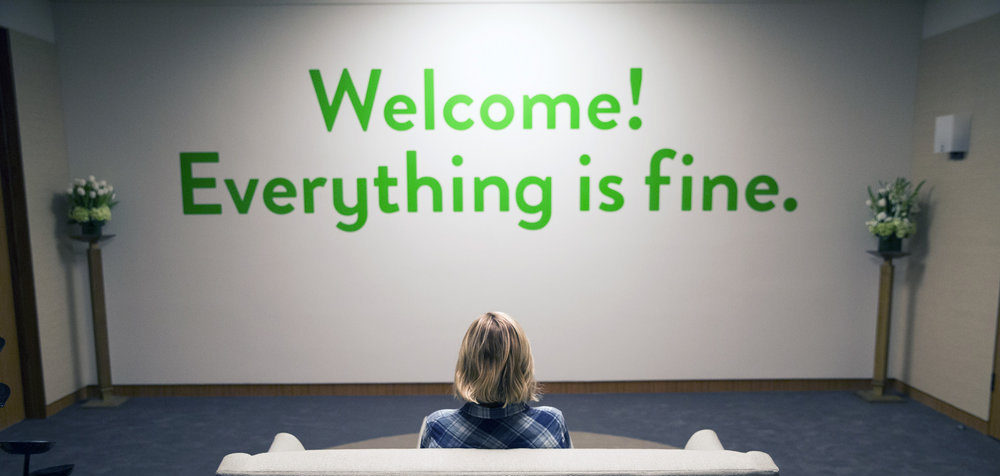The Friday after our meeting with Mike Schur, The Good Class returned to its regular programming. But the visit was fresh in all of our minds, and we were all itching to talk about everything we’d learned, so the first thing we did was debrief. Everyone seemed to agree that the day was almost 104% perfect. All of us (including/especially our professors) have seen some guest speakers who aren’t so great at teaching what they know to others, but Mike Schur was not only smart-brained but also able to get across all the interesting things he had to say in a funny and entertaining way. He was cool with answering whatever crazy questions we had. We also liked that we got to talk to him in both the lunchtime and theater settings–all in all we got a very well-rounded experience.
 In terms of what we learned, we enjoyed his inside perspective on the TV industry and what it’s like to work in a writers’ room, as well as how he’s made TGP one of the kindest working environments in Hollywood for everyone involved. Meanwhile, we (especially Meghan and the philosophy people in the room) also liked hearing his views on philosophy and appreciated his willingness to take a stance on ethics (more on that a little later!)
In terms of what we learned, we enjoyed his inside perspective on the TV industry and what it’s like to work in a writers’ room, as well as how he’s made TGP one of the kindest working environments in Hollywood for everyone involved. Meanwhile, we (especially Meghan and the philosophy people in the room) also liked hearing his views on philosophy and appreciated his willingness to take a stance on ethics (more on that a little later!)
Since Profs. Becker and Sullivan got to spend more time with Schur than we did, they had some extra knowledge to share with us from some of the other events and happenings of his visit. For example, we learned that the writing team for The Good Place writes their scripts in three acts instead of the typical four as a “protest” against the norms of the TV industry. And that we kick off the fourth season with “A Girl from Arizona” instead of another “Everything Is..” title to keep the focus of the episode on Eleanor.
Meghan also told us about his visit to the God and the Good Life classes, which everyone in GGL described as the highlight of their week. She was really interested in Schur’s unique views about moral philosophy–and to explain why, she had to give us all a quick overview of the philosophy of teaching philosophy (Chidi lovers, this one’s for you). We asked ourselves, do philosophers think philosophy can be taught in a way that makes us better people?
First, we learned what Socrates had to say about this. He argues that knowing how to be a good person is the highest form of knowledge. Once you fully understand how to be good, he believes then you will become good. A similar example of this is how you understand your plumbing. Once you understand how all the pipes connect, you will be able to take care of your plumbing and fix your sink when it breaks. In the same way, once you know where your character breaks down, you will undergo a process of self-improvement.

This is why in Plato’s (Socrates’ star student, the Eleanor to his Chidi, you might say) Republic, he proposes a complete revision of the Greek school system. He argues there should be sequenced learning about the ethical truth, so that his city would be full of ethical people. He also said his city should kill everyone over age 11, so the only survivors were the ethically educated. This may seem shocking and problematic for most, except probably not for Michael, who is a big fan of reboots.

THE GOOD PLACE — “Team Cockroach” Episode 204 — Pictured: (l-r) Ted Danson as Michael, D’Arcy Carden as Janet — (Photo by: Colleen Hayes/NBC)
If you don’t like idealistic Socrates, try: pragmatic Aristotle! He argues we see people all the time who know how to do the right thing, and yet they are still Arizona trash bags. Thus, for Aristotle, being good can’t be a matter of getting a traditional education. He says that instead, we should find people who we think are good models of how to live virtuously, or moral exemplars. Once we have our model, we should always be around them and ask them about how they live their lives. He even goes so far as to say you should rank your friends based on virtue, kind of like the points system in Michael’s neighborhood…

 Now, some contemporary philosophers bring us to another question: is ethics even the same thing as knowledge? In other words, is ethics something we’re supposed to know? Does it matter if the average person can’t understand ethics? Many people find that philosophical papers are simply too esoteric. Others might compare philosophy to quantum mechanics. While it’s quite abstract, you just need a base to understand it. If we go back to Aristotle for a moment, he says that we all want to know ethics and we all have the ability to learn them.
Now, some contemporary philosophers bring us to another question: is ethics even the same thing as knowledge? In other words, is ethics something we’re supposed to know? Does it matter if the average person can’t understand ethics? Many people find that philosophical papers are simply too esoteric. Others might compare philosophy to quantum mechanics. While it’s quite abstract, you just need a base to understand it. If we go back to Aristotle for a moment, he says that we all want to know ethics and we all have the ability to learn them.
Next, we asked ourselves: how does The Good Place answer this question? Schur seems to have a very optimistic view about what philosophy can do for the public. As for how to learn it, we would argue the show takes a Socratic stance in the first season. Chidi gives Eleanor a syllabus and she attends his lectures, just like Plato would have wanted. During Schur Day, Mike Schur also told us that he wrote the show so that it mirrors his own philosophical journey. When he first started writing the show, he would print out 40 paged packets for himself and the writers to read. However, over time he started to develop his own opinions, and teased that Season 4 is less about providing a general overview of ethics, and more of an argument for what he believes. Like we’ve said before, we’re thinking he’s a big fan of virtue ethics (refresher: idea that ethics is less about action and more about your character) especially since the characters start raising objections to the points system in Season 3.

Some other fun questions the show had us thinking about were: could Aristotle understand virtue in a utopia without a cohort? Also, is Chidi’s reboot at the end of Season 3 Aristotelian? Aristotle invented moral psychology, and asked questions like: how much of personality is based in memory? When it comes to Chidi, we’re curious if his loss of his memory will change his character at all.
This final question got us talking about the Season 3 finale “Pandemonium,” and helped us transition into talking about fan culture. As fans of the show, almost all of us were upset by Chidi’s memory loss to some degree. But what we couldn’t agree on was whether it was a good plot twist or just some cheesy bullshirt.
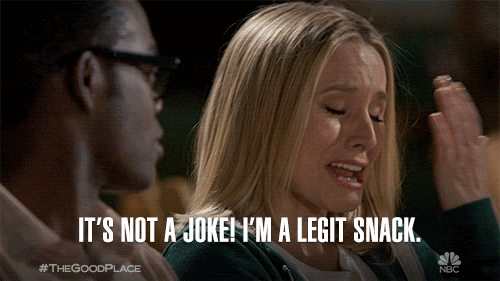
In the second half of season 3, we saw Eleanor and Chidi’s romantic relationship go into full swing for the first time. So a big difference between the ending of season 3 and some of the previous plot twists on the show is that “Pandemonium” is heavily tied to their romantic arc. That raised another question for the class: does focusing on a steady relationship slow the show’s momentum or cheapen the plot twists? Everyone in the class seemed to have different thoughts:
- Some people disliked the ending because it was so reliant on the romance, which they think shouldn’t become the main focus of the show.
- Some disliked the relationship arc, but actually liked the ending because it promises to pull the focus away from the romance in season 4.
- Some thought that the ending was a cheap way to add extra obstacles to a relationship that had started to run out of organic conflict.
- And some thought that the ending, far from being unnecessary, was actually perfectly in line with the themes of the show: By putting aside their relationship for the sake of rescuing humanity from the Bad Place, Chidi and Eleanor demonstrate selfless commitment to a greater good over their personal lives–and after all, selflessness and moral improvement are what The Good Place is all about.
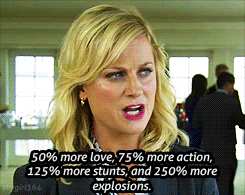
Overall, the Good Class students’ recommendations for Season 4 are summarized above.
Then it was time to welcome our guest speaker, Melanie Kohnen, who’s an assistant professor of Rhetoric and Media Studies at Lewis and Clark College. She was here to tell us about The Good Place at San Diego Comic-Con.
According to Melanie, it’s hard to understand the sheer scale of SDCC if you’ve never been. It’s ten times bigger than one of Tahani’s parties. There are panels, booths by tons of different entertainment companies, HUGE crowds, and lines that wrap around the entire building. It’s a chance for fans to learn more about their favorite shows and properties, and for companies to promote their stuff to a massive audience.
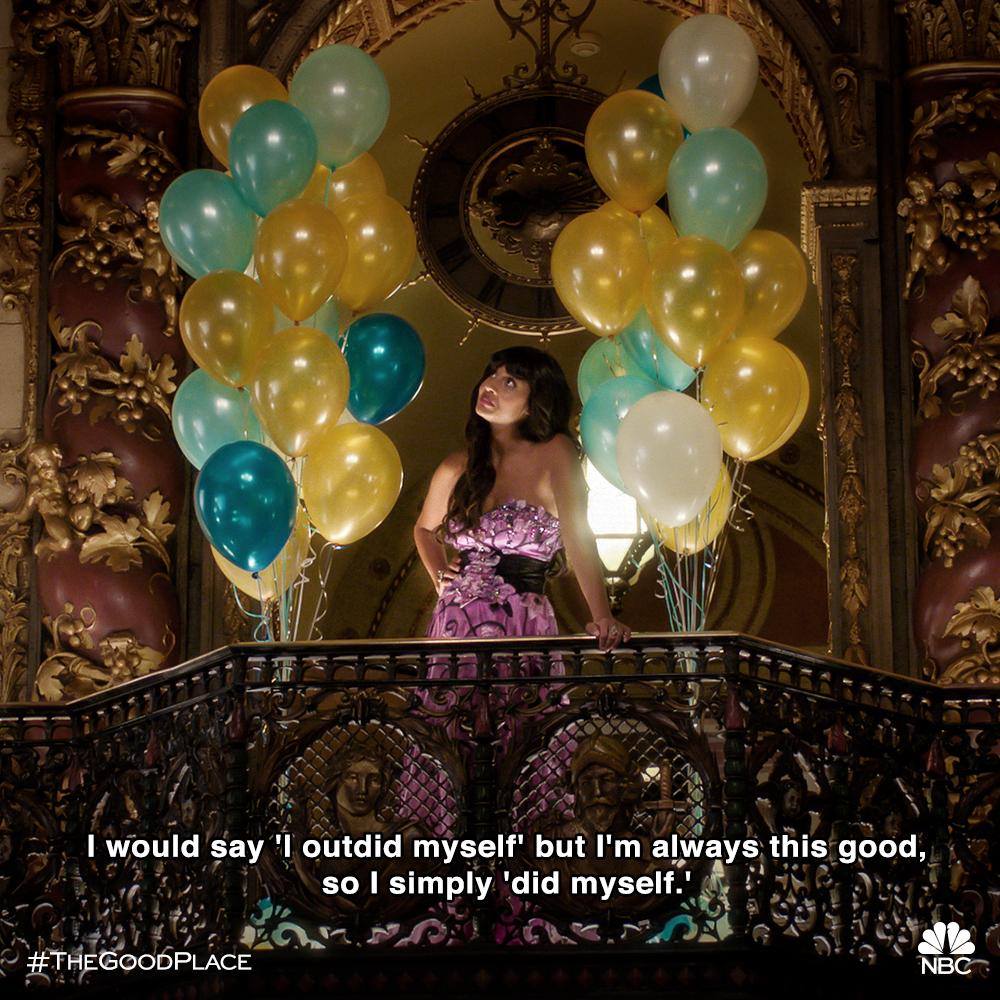
While The Good Place did have its own panel at the con, the main thing Melanie was here to talk about was The Good Place’s offsite experience. Offsites, known more formally as “activations,” are installations by specific media companies, especially TV networks (like NBC!), to promote their properties, typically within walking distance of the convention. Most aren’t officially affiliated with the con, but they’re still considered part of the experience. They’re also included in con coverage by the media, which builds press buzz for them (and hence, for the show they advertise.)
The offsite was free, but that doesn’t mean it didn’t come with a price. First, everyone had to wait in line for 3-4 hours in order to get in! (That’s, like, five years.) And second, in order to enter, every participant had to register their name and email address (giving NBC your information), and be given an RFID tracking bracelet. You could even pre-register for the offsite and be assigned a profile with info about who you were before you “died” and why you’re in the Good Place. While inside, actors in the activation would scan your bracelet and interact with you based on the information they saw. What’s more, almost everything at these offsites is being filmed, and, as explained by various legal disclaimers posted around the site, by entering you allow the company to use any recordings of you they may capture. So in order to join the fun, you not only had to wait in line for a really long time, but also turn over your personal information and allow yourself to be used for potential promotional purposes.

(Image credit: Melanie Kohnen)
The inside of the activation really was like being in the Good Place. There’s recreations of the buildings from the show! There’s fro-yo! There’s interactive activities! There’s interactions with actors posing as residents of the Good Place! There’s even a shrimp merry-go-round! But after only ten minutes of getting to explore, things start to go wrong and a chaos sequence ensues, and then everyone leaves to make room for the next group. After four hours of waiting to get into the Good Place, only getting to see it for ten minutes can seem like a bit of a bummer. (Even though we know that time means nothing—Jeremy Bearimy, baby.)

(Photo credit: Melanie Kohnen)
So all this raised two big questions for us: Why is it worth it for networks to host these crazy events? And why do fans consider it worth it to attend them?
 Well, to answer the first question, marketing has changed a lot in the modern era. People no longer want to be sold just content or products, but experiences—although that didn’t stop them from complaining about the lameness of the swag they got from the event (a plastic shrimp and maybe also the spoon they ate their fro-yo with.) That’s why SDCC has become a huge deal for media companies—it’s a legendary experience for fans. It’s no longer just about comic books, but a place to promote and celebrate anything remotely geeky. So it attracts an audience who will be receptive to marketing and is also likely to spread the word on social media, giving them even more of a boost.
Well, to answer the first question, marketing has changed a lot in the modern era. People no longer want to be sold just content or products, but experiences—although that didn’t stop them from complaining about the lameness of the swag they got from the event (a plastic shrimp and maybe also the spoon they ate their fro-yo with.) That’s why SDCC has become a huge deal for media companies—it’s a legendary experience for fans. It’s no longer just about comic books, but a place to promote and celebrate anything remotely geeky. So it attracts an audience who will be receptive to marketing and is also likely to spread the word on social media, giving them even more of a boost.
And what about the fans? Not everyone in our class thinks it’d be worth it to attend something like this, but Melanie says it is just so long as you plan well. A big selling point of events like SDCC is the community aspect of like-minded groups of people celebrating their interests together. So you might be standing in lines that can seem longer than Michael’s torture career, but at least you’re doing it with your own Soul Squad.
Finally, we asked Melanie what SHE thought of the ending of “Pandemonium.” Like us, she was upset by it—but since this is TV, after all, she believes that Eleanor and Chidi’s love will win out in the end, and they’ll be back to chilling out in the dot of that i together before we know it.
We rate this Chapter:
Coolness: A (is for Antarctica. Very cool.)
Dopeness: The bomb.com. Meghan’s got a dope soul and hella ethics.
Dancing ability: Does this category even matter? We’re starting to think there’s more to life than these street dancing competitions…
Freshness: 8/13. We learned Ricky lives in a grocery store during this class. Very fresh. Organic, even.
Smart-brained: 8/13. We ethics’d you in the face with this one!
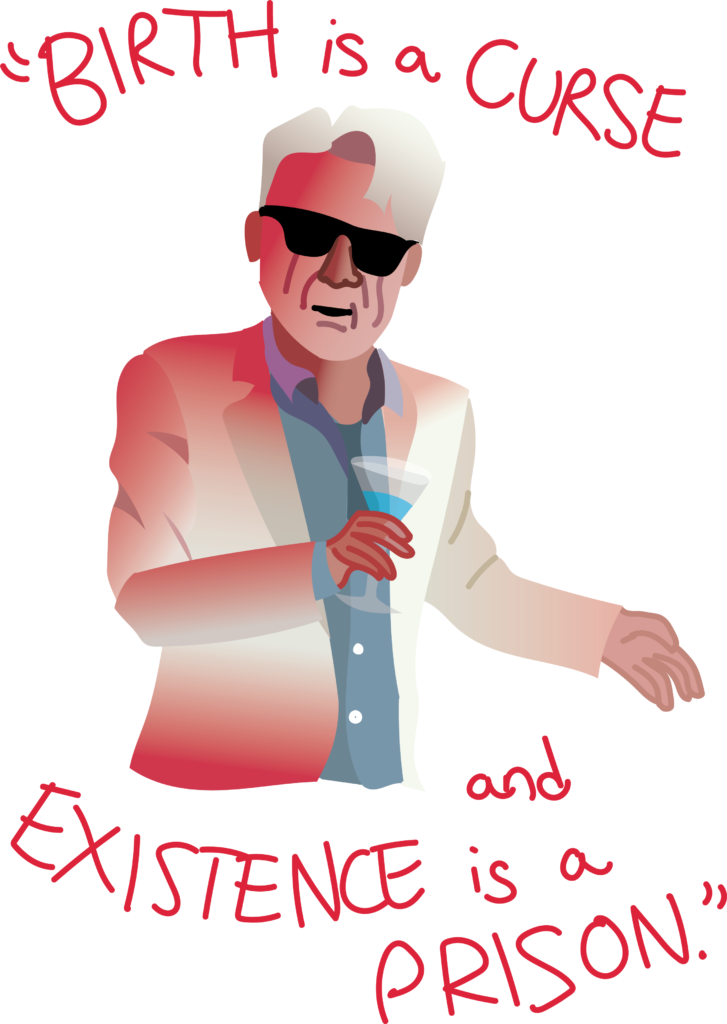
(Image credit: Mary Crawford)
